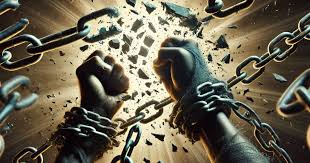Breaking the Chains: Islam’s powerful stand against oppression
Oppression is one of humanity’s greatest evils, leaving scars on individuals and societies. From the whispered cries of the downtrodden to the open wounds of injustice, its impact is both devastating and far-reaching.
Yet, in the midst of despair, the teachings of Islam shine as a timeless antidote, boldly confronting oppression and offering a path to justice and peace.
Oppression: A Forbidden Act
Imagine a world where every act of cruelty, greed, and tyranny is met with swift accountability. Islam envisions this reality, placing oppression among the gravest sins. Allah warns:
“Indeed, the curse of Allah is upon the oppressors” (Qur’an 11:18).
This powerful declaration leaves no room for ambiguity—Islam condemns all forms of oppression, whether it targets the poor, the weak, or entire communities.
But why does Islam take such a strong stance? The answer lies in the belief that every human being is honoured by Allah, created with dignity and rights. To oppress someone is not just a crime against them—it is a defiance of the Creator Himself.
A Legacy of Justice
The life of Prophet Muhammad (peace be upon him) is a masterclass in justice and mercy. When faced with unrelenting persecution in Makkah, he endured with patience and grace. And when the tables turned, and he entered Makkah as a victorious leader, he chose forgiveness over vengeance, declaring to his former enemies, “There is no blame on you today. You are free.”
This moment was more than an act of mercy; it was a lesson for the ages. Justice, in Islam, is not about settling scores—it is about restoring harmony.
The Many Faces of Oppression
Oppression isn’t always loud. Sometimes, it creeps into our lives in subtle ways. Islam identifies and addresses all forms of injustice:
1. Social Oppression: Racism, sexism, and classism have no place in Islam. The Prophet (PBUH) declared in his final sermon: “No Arab has superiority over a non-Arab, nor a non-Arab over an Arab, except in piety.”
2. Economic Oppression: The exploitation of the poor through usury and unfair practices is strictly prohibited. Islam’s emphasis on charity (Zakat) ensures that wealth circulates fairly, protecting the vulnerable.
3. Self-Oppression: Even neglecting one’s spiritual and physical well-being is a form of injustice. Allah reminds us, “Do not wrong yourselves” (Qur’an 2:231).
4. Environmental Oppression: Long before climate change became a global concern, Islam urged humanity to protect the Earth. The Prophet (PBUH) said, “If a Muslim plants a tree or sows seeds, and then a bird, or a person, or an animal eats from it, it is regarded as a charity for him.”
READ ALSO: Lost and Found: 1970s spy images lead archaeologists to ancient Islamic battlefield
The Cry of the Oppressed
Perhaps one of the most chilling warnings in Islam is the power of the oppressed. The Prophet (PBUH) said, “Beware of the supplication of the oppressed, for there is no barrier between it and Allah.”
This saying is a stark reminder to those in power—no throne or wealth can shield them from divine justice if they abuse their position.
What Can We Do?
Islam doesn’t just condemn oppression—it calls on every believer to fight it. Allah commands:
“Stand out firmly for justice, even if it is against yourselves” (Qur’an 4:135).
This is a call to action. Whether it’s standing up for the bullied, helping the needy, or speaking out against corrupt leaders, every act of resistance counts.
A Vision of Hope
The Qur’an offers hope to those suffering under oppression:
“And We wanted to favour those who were oppressed in the land, and make them leaders and inheritors” (Qur’an 28:5).
This promise of justice is a reminder that no matter how dark the times, oppression will never prevail. The oppressors may seem powerful, but their reign is always temporary.
Conclusion: A World Without Oppression
Imagine a world where kindness triumphs over cruelty, where justice reigns over tyranny, and where no cry for help goes unheard. This is the world Islam envisions—a world where oppression is replaced with compassion and equity.
The teachings of Islam are not just words on paper; they are a call to action. They remind us that we all have a role to play in breaking the chains of injustice and building a society rooted in dignity and respect.
May we rise to the challenge and become champions of justice, guided by the timeless wisdom of Islam. For, as the Prophet Muhammad (PBUH) said, “Help your brother, whether he is an oppressor or the oppressed.” When asked how to help an oppressor, he replied, “By stopping him from oppressing others.”
Let us take these words to heart and strive for a world where oppression becomes nothing but a distant memory.
Follow the Neptune Prime channel on WhatsApp:
Do you have breaking news, interview request, opinion, suggestion, or want your event covered? Email us at neptuneprime2233@gmail.com





